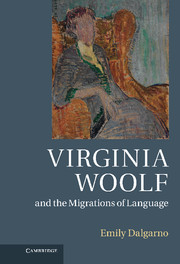Book contents
- Frontmatter
- Contents
- Preface
- Abbreviations
- The migrations of language: introduction
- Chapter 1 Translation and ethnography in “On Not Knowing Greek”
- Chapter 2 Antigone and the public language
- Chapter 3 Tolstoy, Dostoyevsky, and the Russian soul
- Chapter 4 Proust and the fictions of the unconscious
- Chapter 5 Translation and iterability
- Chapter 6 Assia Djebar and the poetics of lamentation
- Conclusion
- Bibliography of works cited
- Index
Chapter 6 - Assia Djebar and the poetics of lamentation
Published online by Cambridge University Press: 07 October 2011
- Frontmatter
- Contents
- Preface
- Abbreviations
- The migrations of language: introduction
- Chapter 1 Translation and ethnography in “On Not Knowing Greek”
- Chapter 2 Antigone and the public language
- Chapter 3 Tolstoy, Dostoyevsky, and the Russian soul
- Chapter 4 Proust and the fictions of the unconscious
- Chapter 5 Translation and iterability
- Chapter 6 Assia Djebar and the poetics of lamentation
- Conclusion
- Bibliography of works cited
- Index
Summary
Haunting belongs to the structure of every hegemony.
Jacques Derrida, Specters of Marx (London and New York: Routledge, 1994), p. 46The abusive translation, which in Philip E. Lewis’ essay forces a reinterpretation of the original work, finds its home in postcolonial literature when the translator’s primary concern is no longer to translate a text from one into another dominant language. While it is true that Assia Djebar cites a Woolf short story in a text she wrote in French, the more significant role of translation is to be found in their reading of lamentation in Antigone as a means to question the policies of the twentieth-century state, and in scenes where narrative strategy begins with the act of translating the mourning cry. In the aftermath of war the scene of female mourning provides the occasion to “renew the energy and signifying behavior that a translation is likely to diffuse.” In the work of Woolf and Djebar the narrator participates in the female rites of mourning, while charging herself with their translation into a dominant language that has hitherto been deaf to their cries of grief. The female narrator who resists assimilating the mourning cry to the conventions of narrative that demand closure establishes an ethical position that is derived from translation.
The premise of Lewis’ argument is that the translator cannot overcome the difference between the two texts. He acknowledges the cultural difference between the word abusive in English, and in French where it means false, deceptive, misleading (and in my Hachette dictionary excessive and unfair as well), as he considers the willingness of an English-speaking audience to tolerate a typically French elliptical use of language. The translator’s predicament is that since the referential structures of English and French are not identical, an adequate translation is unlikely. The problem for the translator is to move away from the logic of identity, and rather to compensate for losses and justify differences. Lewis queries how much freedom to grant the translator’s interpretation, and whether the abusive translation can become a model. “The translator’s aim is to rearticulate analogically the abuse that occurs in the original text, thus to take on the force, the resistance, the densification that this abuse occasions in its own habitat, yet, at the same time, also to displace, remobilize, and extend this abuse in another milieu where, once again, it will have a dual function – on the one hand, that of forcing the linguistic and conceptual system of which it is a dependent, and on the other hand, of directing a critical thrust back toward the text that it translates and in relation to which it becomes a kind of unsettling aftermath.” Yet in these difficult and unpromising conditions, it seems to me that Woolf’s and Djebar’s translation of Antigone, and Djebar’s interpretation of Woolf’s challenges to the language of colonialism, demonstrate that despite, or perhaps because of, these cultural differences the translation of Woolf’s work exerts an unsettling and energizing force both on the work of a postcolonial novelist and in retrospect on her own.
- Type
- Chapter
- Information
- Virginia Woolf and the Migrations of Language , pp. 156 - 188Publisher: Cambridge University PressPrint publication year: 2011

